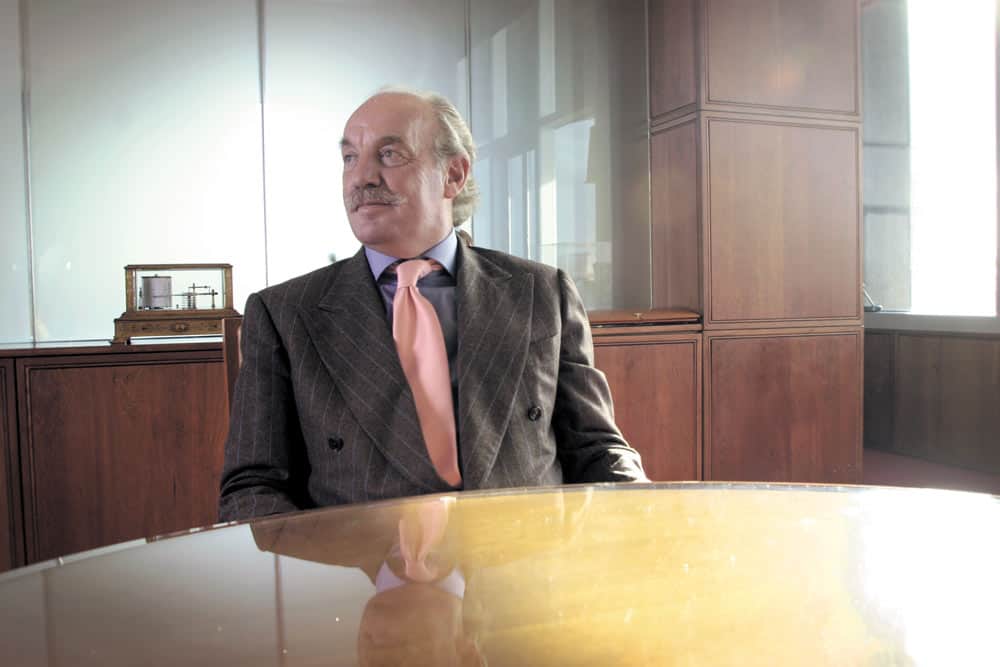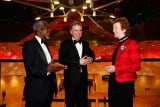Numerous absorbing and dynamic interviews and features have graced the pages of Business & Finance during its history. Through the Decades looks back at a selection of these articles.
Dermot Desmond, 2004
Dermot Desmond speaks to Gabi Thesing about deals, his relationship with Charlie Haughey and why he thinks the break-up of Aer Rianta is wrong.
Dublin’s International Financial Services Centre (IFSC) looks good on a crisp, sunny October morning. Not just busy, efficient and mercenary – even though there is no denying that this is a hub devoted to making people rich.
No, it has turned into an attractive part of town: it is clean, bustling and the students of the latest tenant, the National College of Ireland, have added some diversity and colour to the otherwise rather homogeneous white-collar population of bankers, wheelers and dealers.
There are shops that not only satisfy the lunchtime rush for a sandwich: there are restaurants, dry-cleaners, pubs and a pharmacy. It has a weekly farmers’ market, and the organisers of the Dublin Fringe Festival chose to pitch its gloriously decadent Spiegeltent venue there.
People now own or rent apartments in the IFSC. While it may not have soul yet, there is certainly life in the area that 20 years ago was an absolute ‘no go’ part of town for all the middle-class people who now come here every day of their working week.
Even though he has been taking the credit for the IFSC for the guts of 20 years, Dermot Desmond is still genuinely enthusiastic about its development. He also seems pleased to have proven all the naysayers and doubters wrong.
“I get a kick every time I come down here, I remember in 1987 talking to Michael Buckley how this could transform Dublin. I watched a programme about Patrick Kavanagh the other night and it showed Dublin at half-seven in the morning. Dublin has completely changed,” he says.
“Most people at the time objected to the IFSC, they didn’t want it to happen. They doubted that we could create the number of jobs we said we could.
“If you were to go by what the majority say, you’d never do anything. We’ve all got to realise that the majority doesn’t succeed; it’s always the minority. So I am always looking for a minority view.”
If one were to try and find out what makes Dermot Desmond tick, “looking for the minority view” may not be a bad place to start.
Then again, a two-hour conversation with someone who has crammed at least nine lives into his 54 years will never give you a rounded view of that person. It will give you a snapshot of his thinking between 10am and 12 noon on Monday October 18th 2004.
That is not to say that there are no recurring themes in the conversation – his dislike of the media, his admiration for Charles Haughey and his, at times, difficult relationship with Ireland.
“My irritation with journalists is about how inaccurate they are. I found year on year people write about you and it’s inaccurate, other journalists take that on and it then becomes de facto. A lie is still a lie, it’s a falsehood. I find journalists lazy and they don’t do their homework.”
He argues that he didn’t even court the press when it was useful to gather support in the early 1980s when he set up NCB (which at the time, was taking on the two big established brokers, Davys and Goodbody).
“I would have always been seen as an anti-establishment person. The press decided to magnify that. I never played on it. Never,” he says.
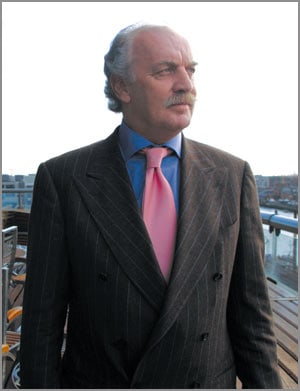 THE MIDAS TOUCH
THE MIDAS TOUCH
Despite rarely talking to the press, he is something of a permanent fixture in the media at home and abroad.
His long and colourful career and varied investments take care of that. And like it or not, he appears to lead a rather interesting life.
We’ve all got to realise that the majority doesn’t succeed; it’s always the minority. So I am always looking for a minority view
Much of the publicity centres on the fabulous lifestyle of the billionaire who owns stakes in Glasgow Celtic and Manchester United football clubs.
Desmond bought the Braveheart sword and plays golf with Tiger Woods who, incidentally, recently got married at Sandy Lane Hotel in Barbados which Desmond owns with JP McManus and John Magnier.
In business circles, he is known as “the man with the Midas touch”.
He calls himself an “eclectic investor” and says there are no rules to his investment decisions. “I don’t have any rules about holding on to something or selling. I’m not a seller, nor am I a buyer in the sense that if I believe something is right for the business and right for me as a shareholder, then I will take that course of action.”
His investment vehicle IIU invests in mature companies (the presence of IIU on the shareholder register can often send the share price soaring in anticipation of corporate action) and nurtures start-ups. Desmond is the sole shareholder in IIU and has recently taken IIU unlimited to operate away from the glare of the media. He says at any given time the investment firm works on 30 to 40 different projects.
IIU has an excellent track record in spotting opportunities and turning them into hard cash for its owner – Quay Financial Software, Esat Digifone, Baltimore Technologies to name but a few.
Currently in the stable you find, among others, betting exchange Betdaq, financial e-learning company Intuition, new health insurer Vivas and biometrics company Daon.
“The story behind Daon is a simple one. I was selling my shares in Baltimore and the share price kept climbing, I sold more and the share price went higher. I didn’t understand it – how could the share price be climbing? – because I couldn’t see the value.
“I felt strongly that, at the height of the Internet boom, it should have generated a lot more cash. Nobody can ever take cash away from you. The share price would have been supported by the cash. Then again, it’s easy to talk with hindsight.
“Anyway, at the time, everyone told me it was a major mistake, so I thought: what is the biggest threat to Baltimore? The threat is if you can protect your own identity by using biometrics. The year was 2000, I got McKinsey to look at it and they thought it was the way forward.
“Then September 11th showed that the world could only be protected by biometrics. We are now partnering with the best in the world. Daon is very exciting, I have put a lot of money into it – and it is still costing me a lot of money – but it is a great opportunity,” Desmond says.
I keep asking people what did Charlie Haughey do wrong and how was he corrupt? The whole issue came about when Ben Dunne gave him the money
MILLENNIUM PROJECT
One project that didn’t get off the ground is Desmond’s Millennium Project in the IFSC, the Ecosphere. He points to the model of the glass pyramid on the boardroom’s windowsill which would have housed a massive aquarium and simulated a tropical forest habitat.
“Unfortunately, we didn’t have a Charlie Haughey in power who’d say let’s get it done. It would have been built by 2000. It takes a man of vision to recognise it. No other politician in Ireland would have built the IFSC but Charlie Haughey.”
The friendship between Desmond and Haughey, and the fact that Desmond gave Haughey and his family money, have been analysed, dissected, scrutinised and investigated.
Desmond has always maintained that he didn’t give Haughey money until he was out of office. No favours were asked or granted and, not surprisingly, he feels that Haughey’s name and legacy have been besmirched and belittled.
“I keep asking people what did Charlie Haughey do wrong and how was he corrupt? The whole issue came about when Ben Dunne gave him the money. I was approached at the time, because Ben Dunne told me he didn’t want Charlie to be embarrassed with the banks. I didn’t have the money at the time.
“If you analyse this for a second. Charlie had borrowed money from the banks, so he was hardly robbing the country. His lifestyle was based on borrowings.”
Desmond argues that the often-repeated mantra that the banks at the time were crucifying the small people, while writing off debts to public figures, doesn’t really hold.
“You had high bank charges under every single government, every minister for finance. Don’t forget it was the 80s, there were twice as many bank accounts as there were people on the island.
“Ben decided to wipe Charlie’s slate clean, without commitment or favour. There was nothing illegal in taking the money, and if he didn’t declare tax that was his own business.”
CHARLIE AND I
Desmond talks very passionately about his relationship with Haughey over the past 20 years.
“He did me the biggest favour: he believed in me.”
It was Haughey who put the IFSC on the Fianna Fáil election manifesto in 1987 after Desmond’s two-year old feasibility study for the project had languished in some official’s drawer. And the rest is well and truly history.
Desmond says the only regret he has about the IFSC is that it has not materialised as a living area. He calls it a complete failure in terms of a living area.
Another big regret he has was resigning as chairman of airport operator Aer Rianta in 1991, following the Telecom Éireann/Johnston Mooney & O’Brien affair.
He still speaks very fondly of Aer Rianta and strongly disagrees with Government plans to break it up. “It is the silliest decision ever. There are too many savings to be made by keeping the three airports together. Why replicate or duplicate overheads, including boards and management?
I’m not a seller, nor am I a buyer in the sense that if I believe something is right for the business and right for me as a shareholder, then I will take that course of action
“There has been a tremendous history of working together, so this was purely a political decision. Seamus Brennan as a minister did an abysmal job and Noel Hanlon did an even worse job. The result is a break-up of a great company.”
Desmond also has very strong views on the fraught relationship between Ryanair and Aer Rianta. While clearly an admirer of the high-flying low-fares carrier, he is less than impressed with its constant sniping at Aer Rianta.
“There would be no Ryanair today without Aer Rianta. When I was chairman of the board, Ryanair owed Aer Rianta hundreds of thousands of pounds. The recommendation was to put Ryanair into receivership because it didn’t pay us. We took a decision that Ryanair was a mould-breaker and we extended additional credit. If it hadn’t got that additional credit, it would have been history.”
While he regrets that he resigned from the board, he says he also learned a lot about airports while with Aer Rianta, leading eventually to the purchase of London City Airport.
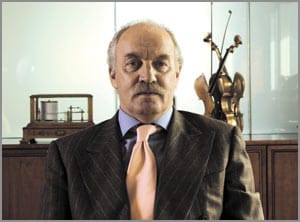 TIME IN KABUL
TIME IN KABUL
Desmond spends a good bit of time in the US personally and also has extensive business interests out there.
Hence the outcome of the US election is of concern to him.
He wants George W Bush to win next month’s election, “to get himself out of the mess he got himself into”.
“I think he went into Iraq for all the right reasons. He was just ill-advised as to how he would get himself out. Also, his military intelligence wasn’t as good as he thought it was.”
As a young executive, Desmond spent the year prior to the Russian invasion in Afghanistan, hence his views on the Middle East may be a bit more informed than mere pub talk.
He says he followed the elections but doesn’t believe that democracy will succeed in Afghanistan.
“It’s a tribal nation, they don’t understand democracy, they want strong leaders. I think it shows a lack of understanding of their culture to impose democracy.”
As a young executive, Desmond spent the year prior to the Russian invasion in Afghanistan
When he talks about his time in Kabul, one gets the distinct impression that the 28 to 29-year-old seriously enjoyed life in pre-mujahadeen society.
“People were very warm, cultured and looked after you. They were also very glamorous: you’d take a picture of a suit out of Vogue, get some material, go to the tailor and, two days later, you had this beautiful suit.”
Desmond worked as an executive for Coopers & Lybrand on a WorldBank/UN project involving the creation of an export finance bank.
Even though it was “only” a year, he says it did put certain things into perspective.
“There are a number of things you learn when you see schoolgirls getting shot: one, that you are a coward and two, that whatever you do for the rest of your life, it is just so small. So much takes place in the world, you just don’t realise it until you’re actually there.”
Desmond’s decision to leave Ireland in 1994 doesn’t sit easy with his detractors who argue that it doesn’t tally with Desmond’s self-declared nationalism and love for Ireland. He divides his time between Ireland, the UK, Barbados and Switzerland.
“I am not a tax exile. Through my various investments in Ireland I create millions in tax revenue in Ireland. I could have all of these jobs in India.
“The reason I left is to have the freedom to do what I want to do. I’m avoiding politicians, I’m avoiding the press and I’m avoiding small-minded people.”
Desmond is 54 now and he looks in good shape. While some of those who know him say he has mellowed a bit, it is still obvious that there is plenty of fire left in him.
He refers to his many travels at the end of every year as an “interesting odyssey”. The same could be said about his life.
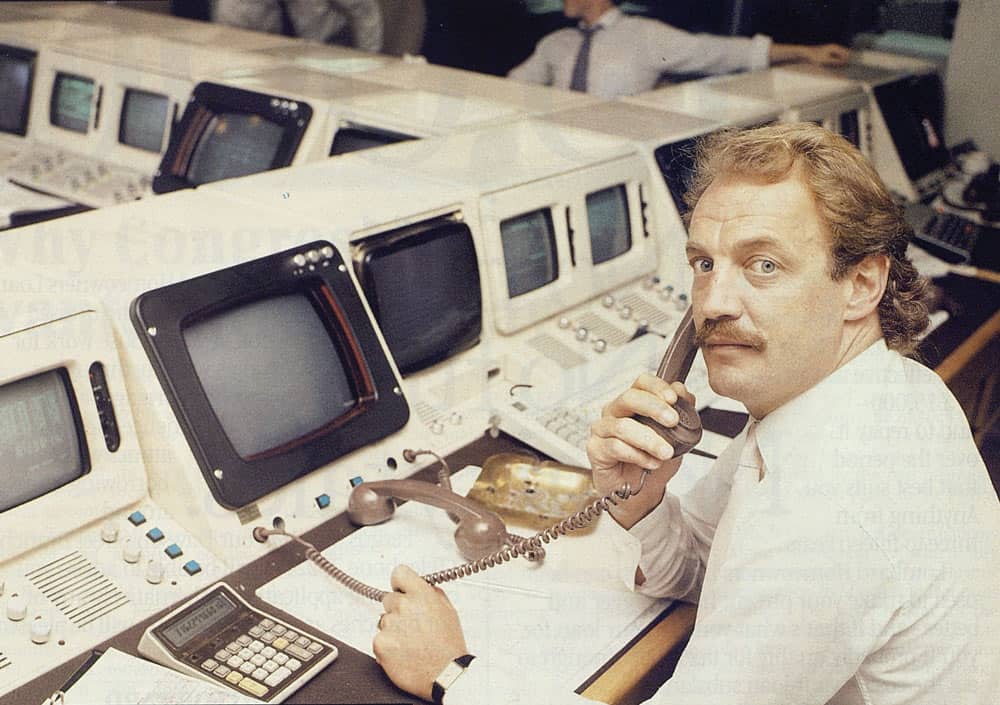
SETTING THE SCENE – 2004
The year was 2004, Bertie Ahern was still Taoiseach; the Luas commenced operation in Dublin; Micheál Martin’s contoversial smoking ban had just come into effect; and Cork-born financier Dermot Desmond had already achieved an extraordinary level of success in his career.
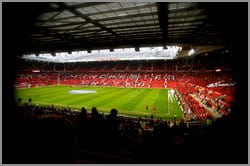 In the 18 months preceding the publication of this interview (published on October 21st 2004) Desmond had acted as kingmaker in taking Barlo private. He also supported the NCB management buyout and attempted to break the mould of health insurance with Vivas Health.
In the 18 months preceding the publication of this interview (published on October 21st 2004) Desmond had acted as kingmaker in taking Barlo private. He also supported the NCB management buyout and attempted to break the mould of health insurance with Vivas Health.
The subsequent year would see Desmond sell is stake in Manchester United FC to Malcolm Glazer and purchased 33.1% of Latvian Rietumu Banka for a reported €66m.
A READING FROM THE BOOK OF DESMOND
Getting older: “I am health-conscious without being fanatical. The older you get, the more you recognise your vulnerability. I go to the gym and do a bit of yoga.”
Telecommunications: “My beief is that the world will go wireless. Fixed-line operatators to me are dinisaurs.”
Friends: “Fortunately I know – since the whole Johnston Mooney & O’Brien affair – who my friends are. The people that were around me then are still around now.”
Life: “For me to complain about anything would be selfish. Everything I am doing, I am doing of my own volition – there is no hardship.”
